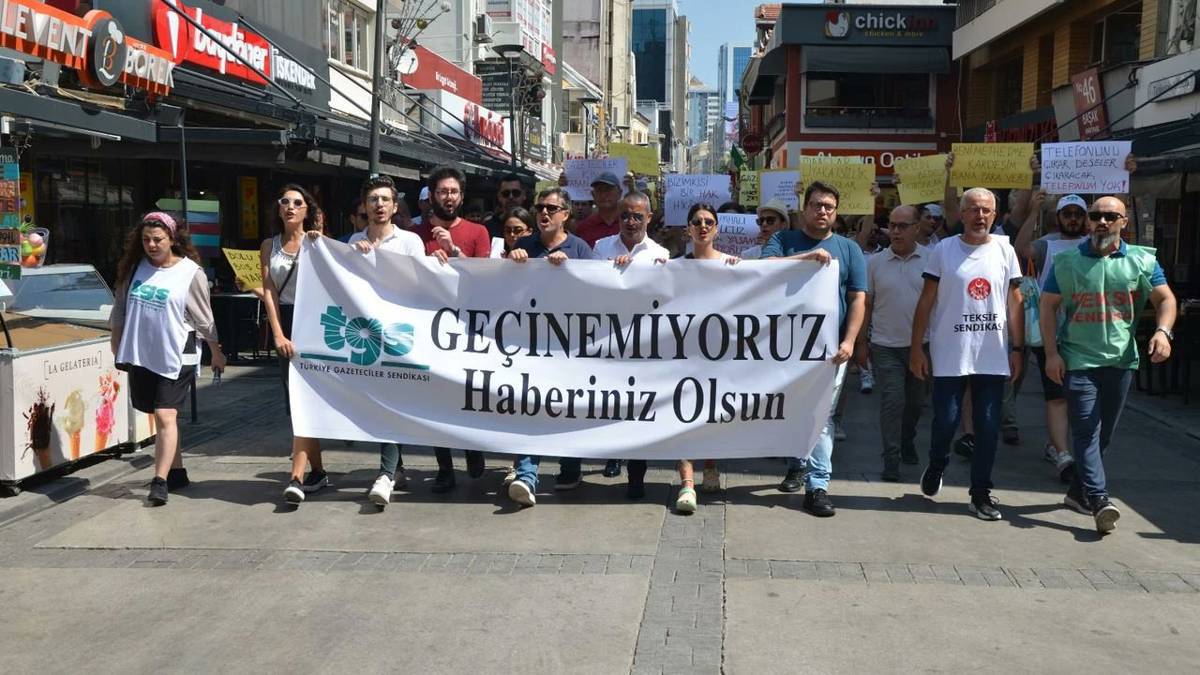Journalists staged a protest today in İzmir, western Turkey, led by the Journalists' Union of Turkey (TGS), highlighting the economic challenges faced by media workers.
The demonstrators carried out a march in the Alsancak district, carrying banners that read, "We can't make ends meet, let it be known" and "Let the bosses pay for the crisis." They chanted slogans such as "News cannot be made with an empty wallet," addressing media owners.
At the end of the march, Nil Kahramanoğlu, chair of the TGS İzmir branch, delivered a statement, emphasizing the severe economic crisis in Turkey and its impact on journalists. She noted the significant poverty experienced by media workers amidst the worsening economic conditions.
‘Journalists at starvation line’
"The starvation line is 18,978 liras," said Kahramanoğlu, referring to reports regularly prepared by unions. This amount, covering monthly food expenses of a household of four people, exceeds the minimum wage of 17,000 liras (1 US dollar = 32.94 Turkish liras).
"We are trying to survive on salaries that were raised to the minimum wage level at the beginning of the year,” said the unionist. “The meal allowances we receive are not enough to cover even ten days of food. Despite this bleak picture, we continue to uphold the principles of our profession."
Kahramanoğlu further criticized the government's policies, saying, "Turkey is experiencing a severe economic crisis. Although the government refuses to acknowledge this, significant impoverishment has occurred, especially over the last two years. Journalists have also been affected by this impoverishment.
“Our average wages have fallen to, or even below, the starvation line. We are struggling to survive on salaries that were set at the minimum wage level at the beginning of the year. With the meal allowances we receive, we can't even eat for ten days. Despite this dire situation, we fight to uphold the principles of our profession."
Experiencing and reporting on poverty
Kahramanoğlu highlighted the daily struggle of journalists who report on hunger and poverty across the country while facing these same challenges themselves. "We are here today not to make news, but to be news, to make our voices heard by newspaper owners. You can't expect quality news from a journalist worried about putting bread on the table, scared of phone calls from the landlord, or the sight of utility bills. You can't expect dedication from a journalist afraid of their child's requests for toys, or creativity from one who can't afford books, movies, theater, or concerts."
She called on the public not to remain silent about the erosion of journalists' rights. "The freedom of our voices and words is the freedom of the entire society. Without journalists, there is no news."
Kahramanoğlu concluded by reminding everyone that July 24 is the Struggle for Press Freedom Day, marking the 116th anniversary of the abolition of censorship in Turkey. "We continue the tradition of struggle left by our predecessors who expelled censors from printing houses and newspapers 116 years ago. Alongside our fight against censorship and self-censorship, we are also fighting for better wages."
Impoverishment of journalists in Turkey
The TGS on May 3 World Press Freedom Day released the ‘2023-2024 Press Freedom Report,’ which also highlighted economic challenges faced by media workers based on a survey:
- Wages below poverty line: Salaries in non-union workplaces are particularly below the poverty line. While 25.4% of journalists in unionized workplaces earn above the poverty line, only 4.2% of those in non-union workplaces do.
- Lack of additional income: Most journalists do not have supplementary income beyond their wages.
- Financial support from family: Nearly half of the journalists in non-union workplaces rely on financial support from their families to make ends meet.
- Struggling with monthly expenses: Over half of the journalists in non-union workplaces find it challenging to cover all their monthly expenses with their income.
- Need for higher monthly income: More than a quarter of all survey participants indicated that they need at least 30,000 liras per month to meet their basic needs.
- Willingness to take extra jobs: While three-quarters of the participants do not currently work additional jobs, they are ready to do so if given the opportunity.
- Major expenses: A significant portion of their income is spent on housing/rent, transportation, and food.
- Perception of poverty: Many participants feel poor, with the majority considering themselves to be in a low-income group.
- Impossibility of buying property: Buying a new or second-hand house or car is seen as impossible in the near future by the respondents.
- Living in rented homes: Half of the participants live in rented homes, and most report that they are not the sole income earners in their households.
(HA/VK)







